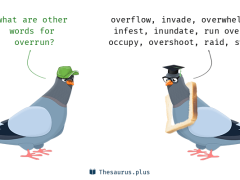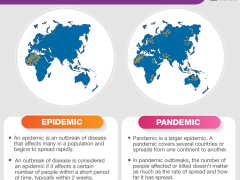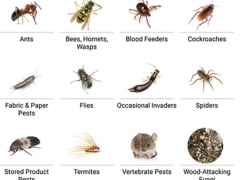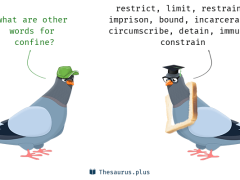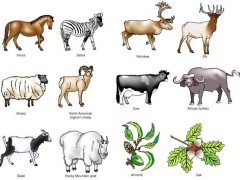settlement [ˈsetlmənt] n. 新拓居地,解决,协议
【搭】in full settlement 偿还全部债务
* * *
A: Have all the problems settled?
B: Yes, all the problems have come to a settlement.
A:问题处理完了吗?
B:是的,所有问题都已经解决了。
* * *
enterprising [ˈentəpraiziŋ] adj. 有事业心的
settler [ˈsetlə] n. 移居者
promiscuous [prəˈmiskjuəs] adj. 杂乱的
【派】promiscuously 杂乱地
【扩】littery 杂乱的 messy 杂乱的
* * *
A: Promiscuous eating habits is bad for your health.
B: I see. But sometimes the work left me no time to have a meal.
A:不规则的饮食习惯对你的健康很不利。
B:我知道,但是有时候工作起来根本没时间吃饭。
* * *
abandon [ˈəbændən] n. 放纵,纵情,放任
【例】Those who abandon themselves to despair can not succeed.
那些自暴自弃的人无法成功。
overrun [ˈəuvərʌn] v. 蔓延,泛滥
【扩】overswell 泛滥 deluge 使泛滥
* * *
A: My house has been overrun by cockroaches.
B: Don't you want to do anything about it?
A:现在我的家中蟑螂猖獗。
B:你就不想做些什么吗?
* * *
devastation [ˌdevəˈsteiʃən] n. 破坏,劫掠
【扩】destruction 破坏,毁灭 demolishment 破坏,毁坏
* * *
A: The devastation of the ecological environment in some areas has worsened.
B: If they don't stop that behaviour, they will be punished by nature.
A:在某些地区,对生态环境的毁坏更严重了。
B:如果他们不停下来的话,会被大自然惩罚啊。
* * *
burrow [ˈbʌrəu] v. 挖,掘
【扩】grub 挖掘 excavate 挖掘
* * *
A: I had to burrow in the library for the books I needed.
B: Wait a moment. I'll go with you.
A:我只好在图书馆搜寻我所需要的书。
B:等一下,我跟你一起去。
* * *
susceptible [səˈseptəbəl] adj. 易受感染的
【搭】be susceptible of 能……的 be susceptible to 对……敏感的
* * *
A: We are all susceptible to advertising.
B: So let's turn off the television.
A:我们都容易受广告的影响。
B:那我们把电视给关了吧。
* * *
virus [ˈvaiərəs] n. 病毒
myxomatosis [ˌmiksəməˈtəusis] n. 多发性粘液瘤
infect [inˈfekt] v. 传染
【派】infection 传染
【搭】be infected with 染上
* * *
A: Go away. I don't want to infect you with my cold.
B: Have you taken any medicine?
A:走开,我可不想把我的感冒传染给你。
B:你吃感冒药了吗?
* * *
epidemic [ˌepiˈdemik] n. 流行病
【搭】an influenza epidemic 流行性感冒
* * *
A: The village was smitten by a kind of epidemic.
B: The villagers there must be very panicked.
A:那个村子被一种传染病侵袭了。
B:那儿的村民肯定特别恐慌。
* * *
mosquito [məˈskiːtəu] n. 蚊虫
carrier [ˈkæriə] n. 带菌者
exterminate [ikˈstəːmineit] v. 消灭
【派】extermination 消灭
【扩】perish 消灭 extirpate 消灭,根除
* * *
A: I must exterminate the mosquitoes before going to sleep, or I can't sleep well in the night.
B: But we don't have any insecticide now.
A:我睡觉前必须把这些蚊子消灭掉,否则晚上我就没法睡好了。
B:但是我们已经没有杀虫剂了。
* * *
ironically [aiˈrɔnikəli] adv. 具有讽刺意味地
【例】Ironically, most people came to watch the match on the day it poured with rain.
老天爷好像成心捉弄人,很多人前来看比赛却偏偏下起瓢泼大雨。
bequeath [biˈkwiːð] v. 把……传给
* * *
A: He bequeathed all of his property to his daughter.
B: He also has a son, right?
A:他把全部财产都遗赠给了他女儿。
B:他还有个儿子对吧?
* * *
pest [pest] n. 害虫,有害动物
pestilence [ˈpestiləns] n. 瘟疫
confine [kənˈfain] n. 范围
【派】confinement 限制
【扩】scope 范围 extent 范围
【搭】between the confines of ……界限之间
domesticate [dəˈmestikeit] v. 驯养
【派】domesticated 驯养的,驯服的
【扩】tame 驯养,使驯服
【例】Thousands of years ago people had learned how to domesticate animals.
几千年以前人们就学会了饲养动物。
noun [具体名词](解决争端的)协议,和解;定居点,聚居地 ;殖民,开拓; <法律>(关于钱财转让的)协议(书);(欠款的)支付,偿付;(地面或建筑物的)下沉,下陷;(按照协议规定收到的)金额;定居行动;结算,清账;解决,处理;<美>部落,村落 - Our objective must be to secure a peace settlement.
noun [专属名词]移居者;殖民者 - The first German village in southwestern Siberia was founded a century ago by settlers from the Volga region.
noun [专属名词](Settler)人名;(德)泽特勒 - "What Arab East Jerusalem?" asks a settler in an Arab area.
verb [vt. 及物动词]抛弃,遗弃;(因危险)离开,舍弃;中止,不再有;放弃(信念、信仰或看法);陷入,沉湎于(某种情感) - If you abandon an activity or piece of work, you stop doing it before it is finished.
noun [抽象名词]放任,放纵。 - If you say that someone does something with abandon, you mean that they behave in a wild, uncontrolled way and do not think or care about how they should behave.
verb [vt. 及物动词]泛滥,横行;超出,超过(预期的时间或金钱);(士兵)占领,蹂躏;越过,延伸到……之外;比(机器的另一部分)转速快 - A group of rebels overran the port area and most of the northern suburbs.
noun [抽象名词]超出的时间,超出的成本(费用);超限运动(或延伸);(机场跑道的)保险道;(车辆的)超限运动 - Her lectures never overrun.
adjective [原级]易得病的,易受影响的;(人)易受感动的,易动感情的;可能有······的,容许······的;<正式>(尤指想法或陈述)能被理解(或证明、解释)的 - Young people are the most susceptible to advertisements.
noun [专属名词]流行病,传染病;(迅速的)盛行,蔓延 - ...an epidemic of serial killings.
adjective [原级]盛行的,泛滥的 - Hospitals were already fully extended because of the epidemic.
noun [专属名词]蚊子 - A single mosquito can infect a large number of people.
adverb [方式副词]具有讽刺意味的是;反讽地,讽刺地 - If you say something ironically, you say the opposite of what you really mean, as a joke.
noun [集合/集体]害虫,有害动物;<非正式>讨厌的人(或物) - You can describe someone, especially a child, as a pest if they keep bothering you.
verb [vi. 不及物动词]限制,局限;防止…扩散;关押,监禁;使离不开(或受困于床、轮椅等) - Health officials have successfully confined the epidemic to the Tabatinga area.
noun [抽象名词]边界,范围;限制,局限 - He did not confine himself to the one language.
sb. was confined to + 地点
- sb. was confined to the room. 某人被关在某个地方
verb [vt. 及物动词]驯养;教化;引进 - We domesticated the dog to help us with hunting.
verb [vi. 不及物动词]驯养;使习惯于或喜爱家务和家庭生活 - If you domesticate this raccoon, it will have trouble living in the wild.



